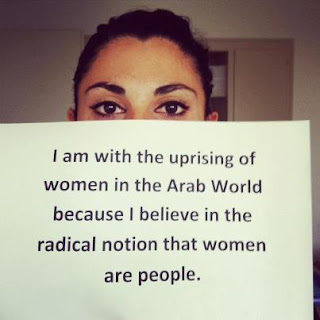We are now supposed to be in the midst of celebrating the 2nd anniversary of the Arab Spring. However, there is a legitimate question of whether or not there is actually anything to celebrate; particularly for women.
Well, take a look at the Arab world today, most Arab Spring countries are still witnessing sporadic violence and political instability. The thing they have in common, to a degree, is that Islamist parties were brought into power to fill the vacuum left by the secular dictatorships that preceded them.
Women and the ‘Arab Spring’
The way I see it, the revolutions which kicked off in these countries and is still ongoing in Syria was the people rising up against oppression. Three pillars drove this movement; Freedom, Liberty and Equality. Let’s look at Egypt, have any of these seen fruition?
The new constitution that was passed in December 2012 in a 2 part referendum touched on these things briefly, but more importantly did they touch on women’s rights. The preamble of the 2012 constitution says Egypt adheres to the principle of equality “for all citizens men and women, without discrimination or nepotism or preferential treatment, in both rights.” But, some critics believe it isn’t precise and is full of loop holes, which gives the current ruling party a chance not to live up to its promises. This fiasco in Egypt is just one example, it is however one of the most prominent incidents since the country ousted Hosni Mubarak. It sparked both local and international condemnation and was picked up by large amounts of the media.
Talking about the revolution in Egypt, let’s mention the 17 women arrested at a Cairo protest on March 9, 2011 as the army violently cleared Tahrir square and were then detained for four days. Some spoke to renowned human rights organizations like Amnesty International after their release and confessed to be subjected to abuse. The head turner is the fact they were forced to undergo virginity tests or else were threatened with prostitution charges.
Women have filed copious complaints of violence used against them during peaceful protests from the start of the uprising until today.
The most recent and most public announcement of this charade was when a television channel owned by an Egyptian cleric saw him go to air and make derogatory and outrageous statements, one being raping women in Tahrir is not a “red line.”
He gave people the green light to sexually abuse women in broad daylight because in his eyes they were asking for it. Abu Islam as most know him was able to get away with making that statement and even had to time to release more defamatory commentary towards Egyptian women and their, already, minor freedoms.
We can all now thank the Egyptian authorities for finally arresting him, but the question is; should he of been allowed to make those remarks and why did it take so long for the government to react.
Isn’t this enough to say that freedom, liberty and equality is still null and void?
As a result of this Egyptian women and a movement called "Tahrir Bodyguards" have taken matters into their own hands. Women are now joining free self-defense classes that have been set up in order to confront the country’s growing phenomenon of sexual harassment. The aim is to combat “systematic political suppression against women,” activist Jumana Shehata told Al Arabiya. She said just a couple of days ago “We’ll continue to take to the streets of Tahrir, no matter the price.”
Sexual harassment is not new in Egyptian society, but its increase has raised many questions. At least 25 female protesters were subjected to sexual abuse in Tahrir Square during demonstrations held earlier this month to mark the second anniversary of the revolution.
Is this the first step Arab women have taken to defend themselves? I don’t think it is the first the second or the third. I feel Arab women will continue to suffer from inequality no matter what uprising or call to freedom is happening in their country. Women’s rights have just been pushed aside.
A women’s ‘Winter’
What I mean by this, is whose fault is it? Are women’s rights organizations and NGO’s just not doing enough? Or are they being suffocated by the governments. In Tunisia’s case is its constitution slowing down the process of gender equality. Aug. 13, 1956 women’s right to equality was passed under the tutelage of Habib Bourguiba, after 56 years and a “jasmine revolution” the U.N. is even calling for the reconsideration of the written document. Articles upon articles have been written about this and how the Arab spring will take years to bring about and improve the rights of women. Queen Noor of Jordan has even echoed these statements. Another example is Libya; it just passed a law, which under the days of Qaddafi seemed fairer. In this North African country, husbands may marry another without their wives' prior consent, which was illegal under the iron-fisted dictator. This just goes to show you, that the outlook of the so called "Arab Spring" on Arab women has had somewhat of a negative effect.
I want to end here by mentioning Saudi Arabia, a country that is always perceived to be curbing rights on women (and they still are yet to gain many, such as the right to drive). It is ironic that whilst the situation is deteriorating in most Arab Spring countries for women, this Middle Eastern kingdom on the other hand has just sworn in 30 female Shura council members. Is this a good thing? Well YES, it is definitely a sign of progress... will it make a difference? We are yet to see.









